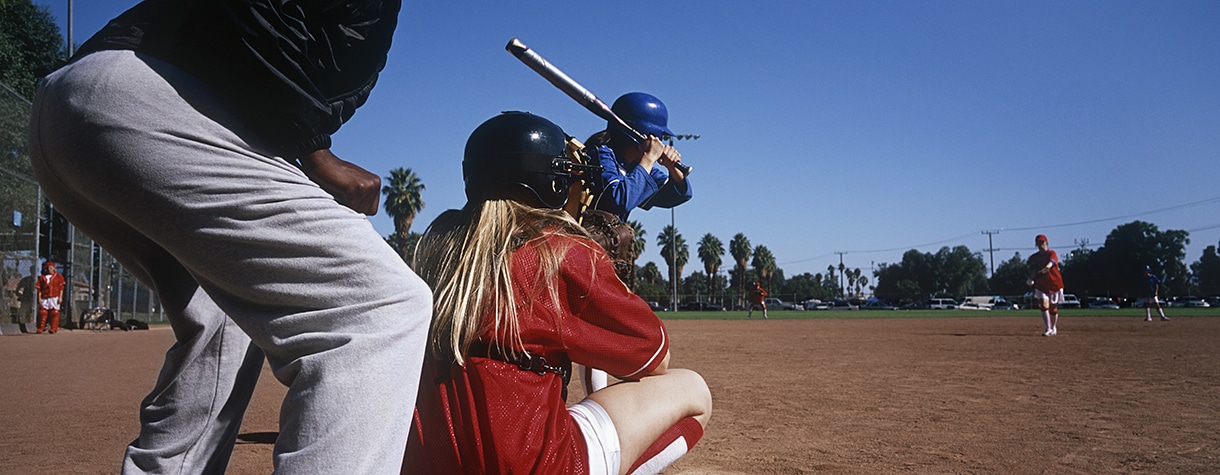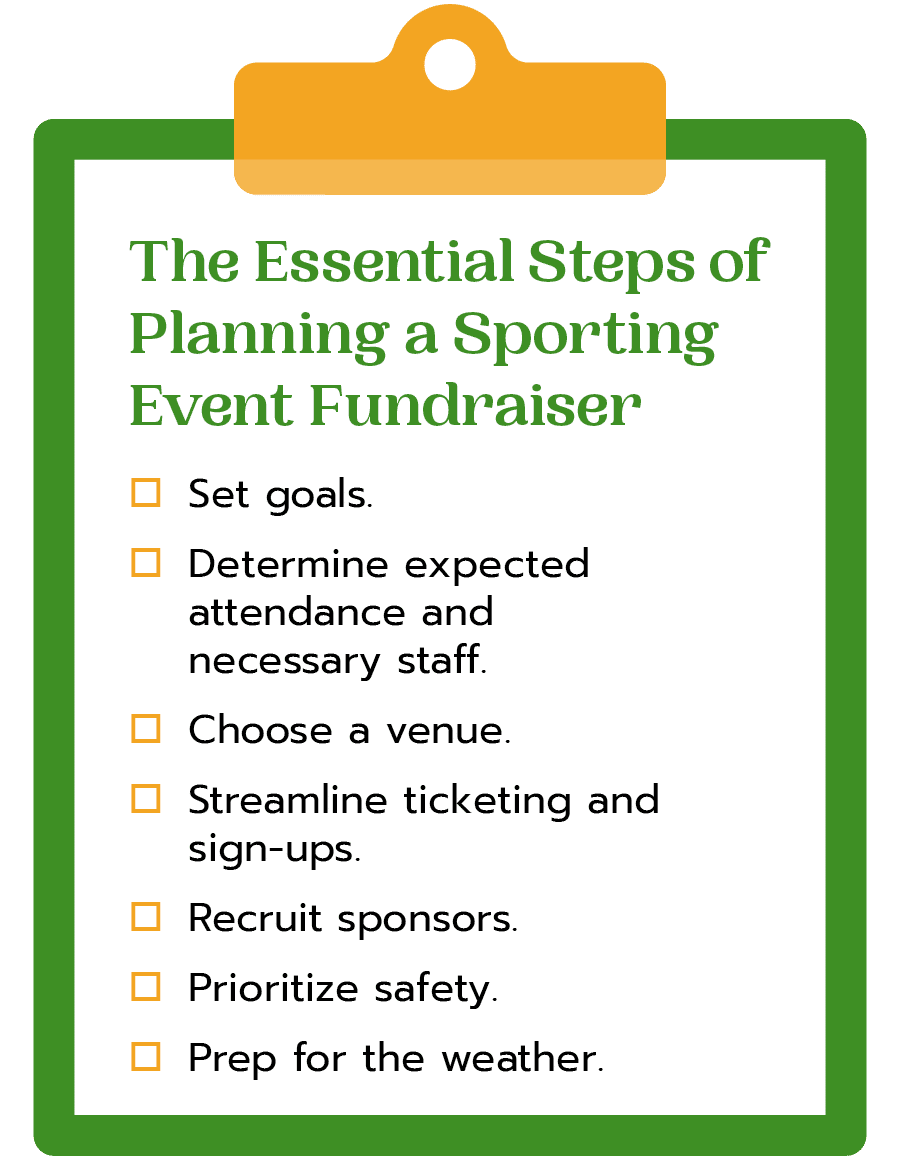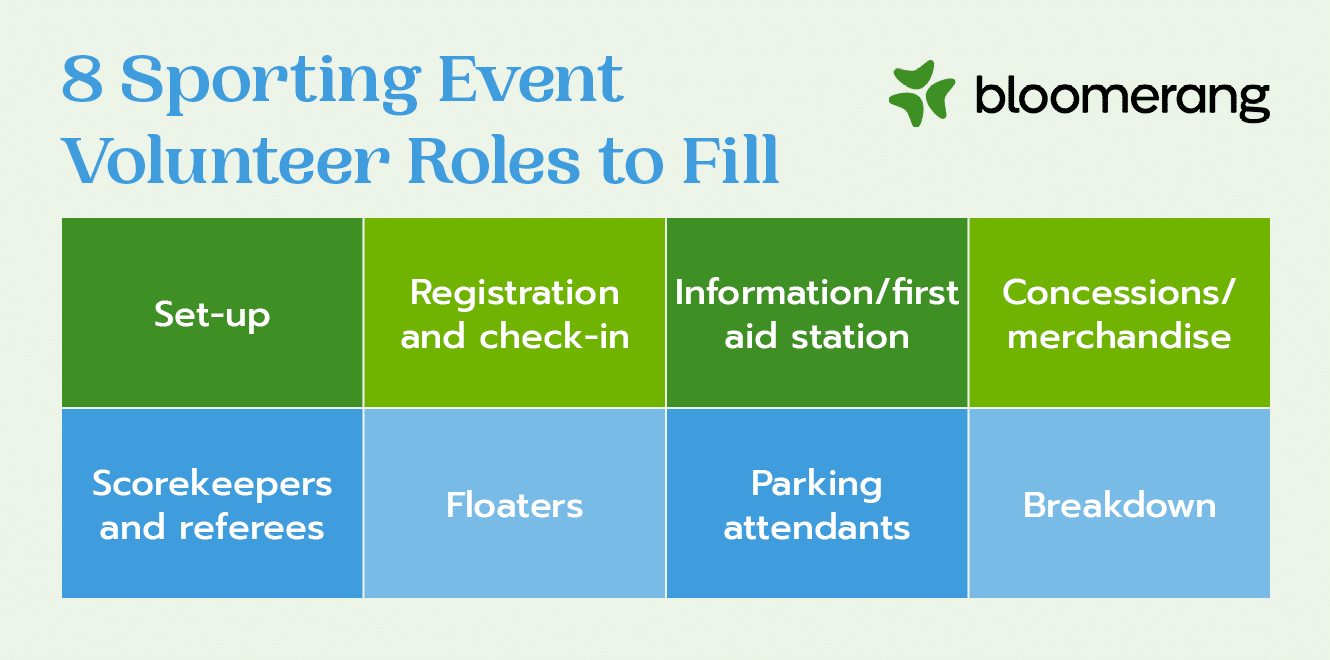7 Essential Steps for Planning a Sports Event Fundraiser



Organizing a sports event fundraiser requires preparation, logistical planning and a key understanding of the sport itself. From finding a venue and recruiting volunteers to arranging all-weather preparations and day-of logistics, a lot goes into putting together a successful sporting event.
But the effort is worth it when your nonprofit can plan a well-attended event that brings the community together to raise awareness of your mission and funding for your cause.
In this post, we’ll provide a checklist of everything you need to plan a successful sports event fundraiser. Here’s what we’ll cover:
A well-run event can enhance your nonprofit’s reputation, helping you recruit more participants and attendees the next time you host a sports fundraiser. Let’s dive in!

Your goals will keep your event planning team on the same page and ensure they’re working to generate the most value possible for your nonprofit. To set your goals, answer the following questions when you first sit down to start planning your sports event:
The more detail you can provide when answering these questions, the easier the rest of your event planning process will be.
Review past fundraising events to understand the type of turnout you can expect for your sporting event. Research similar events that have been hosted in your community and check if you can get access to those events’ attendance numbers.
Once you have a good idea of how many attendees your event can bring in, determine how many event staff and volunteers you’ll need. Large sporting events might take place across multiple sites, meaning you may need a large volunteer team to keep the event running smoothly. Even smaller-scale events require several volunteer roles, from check-in to referees and concessions.
When it comes time to recruit volunteers, start by reaching out personally to past event volunteers to see if they’d be interested in helping out again. You can also put out a general call for help on your website, email newsletter and social media pages.
Be sure to offer volunteers perks for signing up, such as a free t-shirt or a free lunch on event day.
Nailing down your event’s venue should be a top priority. Depending on the type of sports event you’re hosting, the number of venues in your area may be limited. For example, there may only be one or two gymnastics clubs with available space. In contrast, if you are hosting a soccer tournament, there may be multiple fields to choose from.
When selecting your venue, consider how people will get to and from your event and around the site on event day. For example, do you need to rent shuttle buses to move people from the parking lot to your event venue? Do you need to contact the local authorities for permission to block off a section of the street? Think through these considerations well in advance to get the sign-off you need ahead of your event.
Invest in a convenient and simple ticketing tool to streamline the sign-up process. Customers should be able to purchase tickets directly from your website, whether they’re using laptops or mobile devices.
Ensure the athlete sign-up process is straightforward as well by using a simple online registration form. Communicate event logistics with participants, such as when to arrive and how to sign in, to ensure they are kept in the loop leading up to the big day.
Sponsors can help cover the cost of your sporting event, giving you more flexibility when it comes to your venue and other overhead costs. Reach out to local businesses to ask if they’d like to sponsor your event in exchange for advertising on your event’s website, banner, t-shirts and other promotional materials. You can also reach out to local restaurants to see if they’d be willing to donate food or offer discounted event catering prices.
Have medical staff on-site and ready to treat injuries for players or fans. From first aid volunteers to hydration stations, make sure you have everything in place to help participants if and when the need arises.
Investing in volunteer management software that’s equipped with a volunteer app will allow you to manage your staff and communicate with volunteers quickly about emergencies. This can be critical for keeping attendees safe and event staff in the loop.
Many sporting events take place outdoors, meaning you may have to deal with unpredictable weather. Consider planning for a rain-check date in case inclement weather prevents you from hosting the event on the original date.
Some sporting events might be able to continue rain or shine, but bad weather could negatively impact the spectator experience. You might plan to place tents over the spectator bleachers to help people stay dry in the event of rain.
A particularly hot day can also present challenges for athletes and spectators. You’ll need to make sure there are plenty of places to sit in the shade and grab water to keep participants hydrated.
If you’ve planned a major fundraising event before, you know that winging the prep just doesn’t work. Before your event starts, ensure you already have designated duties and a complete schedule for volunteers.
To help out, we’ve made a list of eight essential volunteer roles for your next sporting-related fundraising event:

Designate a volunteer crew to arrive a few hours before your event begins (or the previous day if needed) to set up your event. They might set up your registration tent and concession stand or post signage around the venue to help direct attendees.
Assign volunteers to take tickets if your event is a ticketed experience and check in athletes or teams when they arrive. These volunteers will create a first impression for attendees. To facilitate a smooth check-in, make sure they’re equipped with the resources they need. This might include tablets to track athlete attendance or name tags for participants to use.
If your event’s venue spans multiple fields or courts, it can be helpful to assign volunteers to an information station. Participants will have a clear, central place to go to get their questions answered. It’s also helpful to put your first-aid station near your information desk and clearly mark the station with signs so participants who need medical aid can find help quickly.
Selling concessions can help your nonprofit raise additional funds throughout your event. Ask volunteers with cooking experience to help cook up classic sports-tournament grub like hot dogs and hamburgers. You might also offer snacks like chips and cookies, as well as soda and water bottles.
If your event has merchandise, such as branded t-shirts and hats, you can also assign volunteers to sell these items at your merchandise booth.
Sporting events often require volunteer scorekeepers and referees. Reach out to local referee organizations to ask for volunteers for your tournament. Provide an online checklist of pre-game duties such as inspecting the field, meeting the coaches, completing reports and checking in players. Lastly, provide referees with a detailed list of the rules and regulations of your sports event.
Provide scorekeepers with scorekeeping technology and train them on how to update the scoreboard if you have one. You might also consider providing templates for keeping track of player statistics and standings and writing reports.
There are always things that come up on the fly during a sporting event, so it’s worthwhile to assign a team of volunteers who are ready to help out anywhere. Make floaters their own role, rather than pulling volunteers off other roles when it gets busy. Volunteer management software can help maintain real-time communication with floaters so you can contact them wherever they are.
Parking is often where attendees find the most frustration. Create a team of volunteers who can ensure that the parking process is as painless and easy as possible. Post parking maps online so your volunteers and attendees can familiarize themselves with the parking zones ahead of time.
Designate a fresh breakdown crew on the schedule instead of using the same crew that arrived early for setup. Post a checklist of breakdown duties on your volunteer app and provide printed lists. Make sure all breakdown volunteers follow appropriate safety procedures.
Finally, designate an official trash crew and assign them sections to monitor and clean during the tournament. Keep in contact with them in real-time if you need to call them for an emergency cleanup.
All of these volunteer roles contribute to the success of your event, meaning you should make it a priority to show appreciation to everyone involved. Send detailed thank you emails after your event concludes or give volunteers appreciation gifts such as gift cards or tote bags.
Social media is a staple of our everyday lives, and it’s fair to say that your event could benefit from drumming up some interest online. Leverage social media to make sure people know when and where your event takes place. Start by sending out teasers and, as the event gets closer, release more specific details.
The more you can spread the word before, during and after your event, the greater its success is likely to be. Here are a few of our favorite marketing strategies to roll out as you plan your sports event:
Facebook is a natural place to promote your sports event fundraiser because 35 million people view public events on Facebook each day. Use a high-quality banner image on your event page and provide information potential attendees need to know. This includes details about:
You can reach out specifically to dedicated supporters to invite them to your event. Be sure to post the event page widely within Facebook groups and on your news feed to keep your event on supporters’ radars.
While Facebook offers great event promotion options, it’s important to promote your event through all your social media channels. Here are a few additional platforms to consider:
Regardless of the channels you choose, consider creating a unique hashtag, holding contests and ticket giveaways and encouraging user interaction to spread the word as far as possible. Sporting events can bring in a wide range of audience demographics, so the more channels you use to promote your event, the wider an audience you’ll reach.
Your event will likely include participation from multiple organizations, such as local sports teams, food vendors and sponsors. Ask participating organizations to promote your event on their social media pages and other marketing outlets. In return, publicly thank them for their involvement on social media and share links to their social media pages or websites.
All major social media platforms offer pay-per-click advertising as a way to reach your target demographics. These channels, as well as Google’s search advertisements, provide a streamlined way to better reach your target audience. Nonprofits can even apply for the Google Ad Grant program which provides $10,000 per month in free Google advertising to qualifying organizations.
Reach out to local news outlets like newspapers, radio stations and local TV stations to ask if they would be interested in promoting your upcoming sports event. Write up a press release with information local news outlets will need to have for your event, such as the date, time, location and how to register or purchase a ticket.
With these tips, your nonprofit should be able to plan an engaging sports event that brings in new supporters and funding for your mission.
Every successful event starts with a dedicated team of staff and volunteers—and the right tools that empower them to take on their roles effectively. Bloomerang’s volunteer management software offers nonprofits the user-friendly tools they need to streamline volunteer recruitment, scheduling, communication and appreciation. Plus, Bloomerang’s volunteer mobile app centralizes communications on event day, keeping all volunteers in the loop about schedule changes or unexpected events.
Looking for more information about planning events and managing volunteers successfully? Check out these additional resources:

Comments